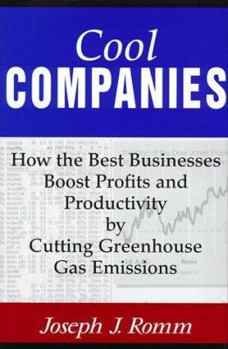Cool Companies: How the Best Businesses Boost Profits and Productivity by Cutting Greenhouse-Gas Emissions
Select Format
Select Condition 
Book Overview
Despite ongoing negotiations, consensus has not yet been reached on what action will be taken to combat global warming. A number of companies have looked beyond the current stalemate to see the... This description may be from another edition of this product.
Format:Hardcover
Language:English
ISBN:1559637099
ISBN13:9781559637091
Release Date:April 1999
Publisher:Island Press
Length:287 Pages
Weight:1.15 lbs.
Dimensions:1.3" x 6.0" x 9.0"
Customer Reviews
3 ratings
simple approach and numerous examples
Published by Thriftbooks.com User , 23 years ago
The book should enlighten those equating the green movement with adverse economic impact. It simply doesnt have to be the case. Companies like Shell and Dow are realizing, the early birds will gain serious competitive advantages when adopting "cooler" operating philosophies including: lower operating costs in general, increased productivity, and lower carbon costs when they ultimately get implemented. Numerous verified examples are provided that cement what should be a common sense belief that reduction of waste (all types) lead to leaner more competitive companies.I approached my own boss with these ideas and received a chuckle in response. Its an uphill fight out there, hopefully the more people become informed, the easier it will be. This book is a great one to hand to a nay sayer. (I plan on sending a copy to both my boss and President Bush for Christmas)
Improving your Bottom Line by Reducing Greenhouse Gases
Published by Thriftbooks.com User , 24 years ago
By Stephen Corrick Reprinted with permission...Joseph J. Romm was an Assistant Secretary of theUS Department of Energy. He obviously learned his lessons well. Hisbook, Cool Companies, makes an overwhelming case: Not only willreducing greenhouse gases not hurt companies' ability to compete, the action of reducing greenhouse gases (and industrial energy waste generally) offers the single easiest productivity booster, and among the shortest payback periods of any available to American industry today.Cool Companies offers insights into the detailed processes by which all company sites-from industrial giants like DuPont and 3M all the way down to individual apartment owners-have used greenhouse gas emission reduction to drive many more dollars to their bottom line.The only question one is left with after Romm so effectively makes his case is why the coal and oil companies are playing Chicken Little and screaming that reducing greenhouse gases will hurt American business. Obviously, the only American businesses they are referring to must be their own. The Wall Street Journal and the American Chamber of Commerce would be well served to get the true picture and start representing the needs and interests of the majority of their customers-whose interests, at this point, are often diametrically opposed to those of the fossil fuel industry.
Run out and buy this book, before your competitors do
Published by Thriftbooks.com User , 25 years ago
Romm has done a great service with this book. There are a lot of people telling us we must act on climate, and a lot of theory on how. Too often, it is abstract and esoteric -- Romm gives practical, easy to follow examples of how the best in class cut costs; cut carbon; and boosted productivity. If you work anywhere in corporate management -- Whether you are the Chief Operating Officer, The Chief Financial Officer, the Plant Manager, or the Environmental Manager, you need to run out and buy this book, and then read it, before your competitors do. You'll find case study after case study of how the best companies cut carbon. From building design, to the office environment, to industrial processes on the plant floor, this book tells -- often in the words of the managers themselves -- how they did what they did. Not only the technologies they chose, but how they sold other managers, developed creative financing strategies(often getting projects financed off ledger, out of future savings for example), and obtained credit for cutting other emissions. If you are an environmentalist or a regulator facing the prospect of a climate treaty, the examples Romm outlines show why the arcane debate about the cost of cutting greenhouse gasses is flat out irrelevant. Cool Companies save money by becoming more efficent. Bottom line? If you read only one book on cutting greenhouse gasses -- make it this one.





